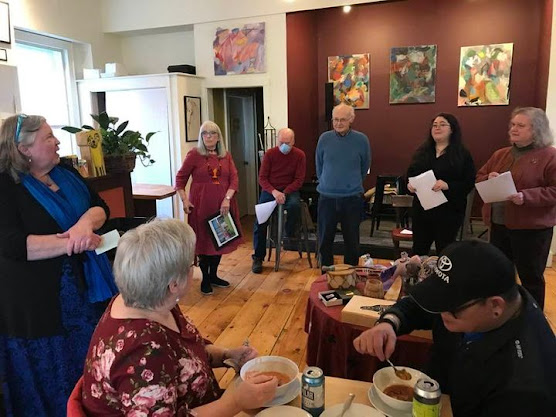
In 1813, French scientist Michel Eugene
Chevreul discovered a new fatty acid which he dubbed acide margarique, named,
in part, after the “pearly
deposits in the fatty acid, “margarites”
being the Greek word for “pearly.”
Enter French chemist Hippolyte
Mège-Mouriès. In 1869, working with Chevreul’s discovery, perfected and
patented a process for churning beef tallow with milk to create an acceptable
butter substitute. Napoleon III, seeing that both his poorer subjects and his
navy would benefit from having easy access to a cheap butter substitute,
offered a prize for anyone who could create an adequate replacement. Mège-Mouriès
won.
Despite Napoleon III’s high hopes for
Mège-Mouriès’ product, which the scientist had dubbed “oleomargarine,” the
market didn’t really take off. Not to be
deterred, Mège-Mouriès showed his process to a Dutch company called Jurgens.
The CEOs realized that if margarine was going to become a butter substitute, it
needed to look more authentic, so they began changing margarine’s naturally
white color to a buttery yellow.
Mège-Mouriès didn’t get much for his
invention and died a pauper in 1880. Jurgens, however, did pretty well for
itself. It eventually became a world-renowned maker of margarine and later
became a part of Unilever.
Margarine arrived in the United States in
the 1870s, to the happy approval of the poor, and to the universal horror of
American dairy farmers. Within ten years, 37 companies in the United States
enthusiastically manufactured it. The terms “margarine” and “butter” had become
fighting words.
In 1886 the
Federal Margarine Act slapped a special two-cent tax on margarine and required
annual license fees. Margarine producers
were forced to pay $600 a year; wholesalers, $480; and retailers, $48, simply
to be allowed to sell the product. “An amendment in 1902 targeted the
production of artificially yellowed margarine, imposed a ten-cent tax on
(butter-colored) margarine and slashed the tax on the uncolored variety.”
Maine, Michigan, Minnesota, Pennsylvania,
Wisconsin, and Ohio went a step further and banned margarine outright. In fact,
the Wisconsin law stayed on the books until 1967, which lead to the introduction
of clandestine “margarine runs” that friends and neighbors set up. Every couple
of weeks they’d send one person over the border to purchase margarine for all
of them and illegally transport it back across the state line.
In June 1886, Washington State passed a
bill in the House to regulate the manufacture and sale of “all substances made
of oleomargarine, oleomargarine oil, butterine which was butter mixed with a little Oleomargarine to improve flavor, suine which was a
mixture of oleomargarine with lard or other fatty ingredients, lardine, an agricultural import
from Germany, and all lard extracts, tallow extracts, and compounds of tallow, beef,
fat, suet, lard and lard oil, vegetable oil, coloring matter, intestinal fat,
and offal fat,” which were disguised as and sold as butter.
An article in the 7-22-1886 Tacoma Daily Ledger claimed “the
butterine vat was a graveyard of compounded diseases putrefied into carrion.”
At this time, Washington had a State Dairy
commissioner named E. A. McDonald. And when he wasn’t approving cheese
factories or visiting farms to kill tubercular cattle, he was haunting cheap
restaurants looking for fake butter and the people selling it, and seizing what
he found. However, he recognized that local dairy farmers were only able to
provide about 2 / 3 of homemakers’ demands. The use of oleo was on the rise.
By the early 1890s, the country was in the
middle of a Depression. Businessman J. A. Sproule recognized that Butterine and
other substitutes for butter kept longer than the real thing. And one person
was making good use of Butterine. His name was Jim Wardner who had been a store
keeper in South Dakota until a fire wiped him out. Not to be deterred, he
borrowed $5,000, had eggs shipped from the east and began peddling them in
mining camps. He then used his profits to buy Butterine which he also peddled until
a heat wave melted what he hadn’t sold and the Butterine separated into puddles
of cottonseed oil, lard, Vaseline and coloring. So as not to waste his
investment, he sold the puddles as industrial grease.
During W W I, the cost of oil more than
doubled driving up the price of oleo. During W W II butter was rationed because
most cooking oils came from Pacific lands conquered
by the Japanese; the supply plummeted. Fats were also needed in high quantities
for industrial and military use. For the homemaker, butter used a higher number
of ration-book points than margarine, so “oleo” margarine became more popular.
Lard was removed from
rationing on March 3, 1944 and shortening and oils on April 19, 1944, but
butter and margarine were rationed until November 23, 1945. Until 1952, white
oleo, came with a packet of yellow food coloring to be kneaded in.
Gradually,
states allowed the sale of yellow oleo. However, a reluctant Washington held
out until December 4, 1952, becoming the 44th state to all allow the
sale of yellow oleo.


































